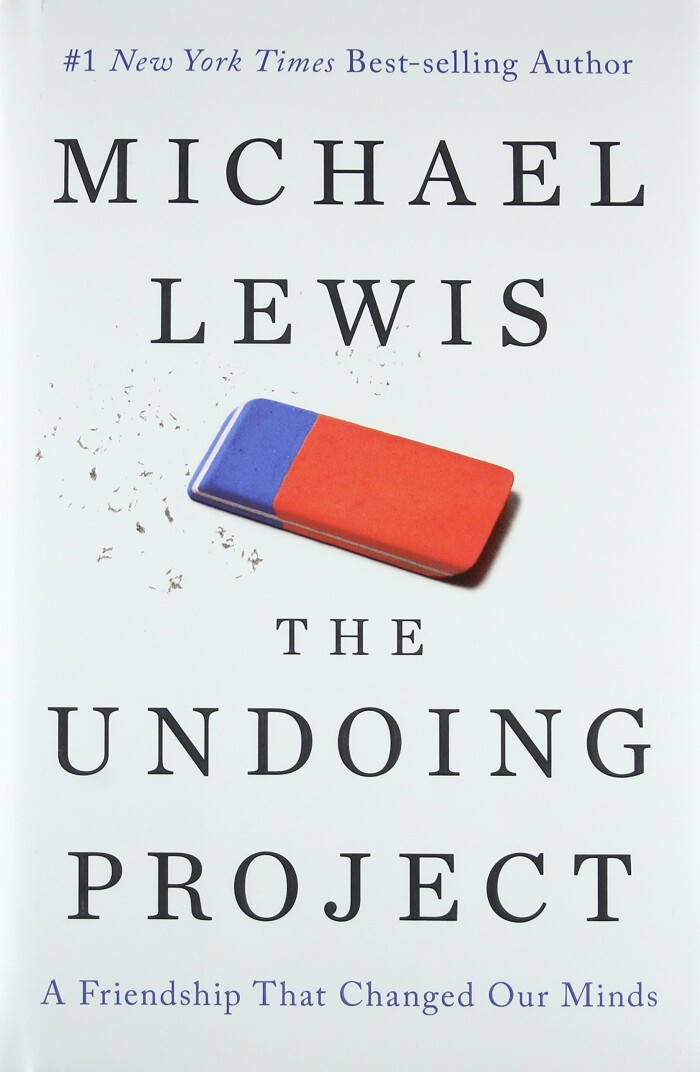
Support the author by purchasing this book with the link below!
PurchaseThe Undoing Project
Michael Lewis
Published: 2016
The Undoing Project: A Friendship That Changed Our Minds by Michael Lewis is a non-fiction book that tells the story of the partnership and friendship between two Israeli psychologists, Amos Tversky and Daniel Kahneman, and how their work together led to the development of the field of behavioral economics. The book is a fascinating and engaging look at the science of decision-making and the lives of two brilliant minds who helped shape it.
The book begins by describing how Tversky and Kahneman met in the 1960s at Hebrew University in Jerusalem. Tversky, who was a brilliant young mathematician, and Kahneman, a psychologist, were both interested in understanding how people make decisions. They began a collaboration that would last for over a decade and would change the course of psychological research. Through a series of experiments, Tversky and Kahneman revealed a number of systematic errors in human judgment and decision-making, which they dubbed "cognitive biases." These biases, such as the availability heuristic, in which people estimate the likelihood of an event based on how easily an example comes to mind, and the sunk cost fallacy, in which people continue to invest in a decision based on the resources they have already invested, are still widely studied today and have had a significant impact on fields like economics, finance, and medicine.
One of the most interesting aspects of the book is the personal relationship between Tversky and Kahneman, and how it evolved over the course of their work together. Lewis delves into the dynamics of their partnership and how it ultimately led to a falling out, despite their many successes. He provides a behind-the-scenes look at their collaboration and the creative process that led to their groundbreaking research. The book also deals with the impact of Tversky and Kahneman's work in the fields of economics, finance, medicine, and law and the debate their work generated among peers in the field, it also follow the journey of their research being implemented and applied in real world scenarios.
The book is written with Lewis's signature storytelling style, making it accessible and engaging for general readers while providing a detailed information on the research and work of Tversky and Kahneman. The book is a must-read for anyone interested in behavioral economics, decision-making, and the workings of the human mind. It offers an interesting perspective on the scientific process and the role of collaboration and friendship in scientific discoveries.
The book begins by describing how Tversky and Kahneman met in the 1960s at Hebrew University in Jerusalem. Tversky, who was a brilliant young mathematician, and Kahneman, a psychologist, were both interested in understanding how people make decisions. They began a collaboration that would last for over a decade and would change the course of psychological research. Through a series of experiments, Tversky and Kahneman revealed a number of systematic errors in human judgment and decision-making, which they dubbed "cognitive biases." These biases, such as the availability heuristic, in which people estimate the likelihood of an event based on how easily an example comes to mind, and the sunk cost fallacy, in which people continue to invest in a decision based on the resources they have already invested, are still widely studied today and have had a significant impact on fields like economics, finance, and medicine.
One of the most interesting aspects of the book is the personal relationship between Tversky and Kahneman, and how it evolved over the course of their work together. Lewis delves into the dynamics of their partnership and how it ultimately led to a falling out, despite their many successes. He provides a behind-the-scenes look at their collaboration and the creative process that led to their groundbreaking research. The book also deals with the impact of Tversky and Kahneman's work in the fields of economics, finance, medicine, and law and the debate their work generated among peers in the field, it also follow the journey of their research being implemented and applied in real world scenarios.
The book is written with Lewis's signature storytelling style, making it accessible and engaging for general readers while providing a detailed information on the research and work of Tversky and Kahneman. The book is a must-read for anyone interested in behavioral economics, decision-making, and the workings of the human mind. It offers an interesting perspective on the scientific process and the role of collaboration and friendship in scientific discoveries.
1. Tversky and Kahneman's collaboration led to the development of the field of behavioral economics, which focuses on understanding how people make decisions and the cognitive biases that influence those decisions.
2. Tversky and Kahneman's experiments revealed a number of systematic errors in human judgment and decision-making, such as the availability heuristic and the sunk cost fallacy.
3. Tversky and Kahneman's findings have had a significant impact on fields like economics, finance, medicine, and law, and it is still widely studied today.
4. The book also provides a detailed account of the personal relationship between Tversky and Kahneman and how it ultimately led to a falling out, despite their many successes.
5. The book shows how Tversky and Kahneman's work was able to be applied in various areas like finance, sports, and also how it influenced policies in certain areas.
6. The book also illustrates the process of scientific discovery and the importance of creative thinking and collaboration in making groundbreaking scientific advances
7. The book highlights the importance of recognizing and understanding cognitive biases in decision-making and how it can lead to more accurate and rational choices.
8. The book also brings to light the idea of "heuristics" and how they may be both good and bad for decision making.
9. The book also calls out on how the experimenters themselves can be prone to biases and how it can affect the outcome of their experiments.
10. The book serves as a reminder of the role of intellectual humility in scientific discovery and the human ability to make mistakes despite being experts.
2. Tversky and Kahneman's experiments revealed a number of systematic errors in human judgment and decision-making, such as the availability heuristic and the sunk cost fallacy.
3. Tversky and Kahneman's findings have had a significant impact on fields like economics, finance, medicine, and law, and it is still widely studied today.
4. The book also provides a detailed account of the personal relationship between Tversky and Kahneman and how it ultimately led to a falling out, despite their many successes.
5. The book shows how Tversky and Kahneman's work was able to be applied in various areas like finance, sports, and also how it influenced policies in certain areas.
6. The book also illustrates the process of scientific discovery and the importance of creative thinking and collaboration in making groundbreaking scientific advances
7. The book highlights the importance of recognizing and understanding cognitive biases in decision-making and how it can lead to more accurate and rational choices.
8. The book also brings to light the idea of "heuristics" and how they may be both good and bad for decision making.
9. The book also calls out on how the experimenters themselves can be prone to biases and how it can affect the outcome of their experiments.
10. The book serves as a reminder of the role of intellectual humility in scientific discovery and the human ability to make mistakes despite being experts.
The Undoing Project is a nonfiction book written by Michael Lewis that was published in 2016. The book tells the story of the partnership and friendship between two Israeli psychologists, Amos Tversky and Daniel Kahneman, and how their work together led to the development of the field of behavioral economics.
Tversky and Kahneman met in the 1960s and began a collaboration that lasted for over a decade. They conducted a series of experiments that revealed a number of systematic errors in human judgment and decision-making, which they dubbed "cognitive biases." These biases, such as the availability heuristic and the sunk cost fallacy, are still widely studied today and have had a significant impact on fields like economics, finance, and medicine.
The book also explores the personal relationship between Tversky and Kahneman, and how it evolved over the course of their work together. Lewis delves into the dynamics of their partnership and how it ultimately led to a falling out, despite their many successes.
In addition to providing an in-depth look at Tversky and Kahneman's work, The Undoing Project also examines the broader implications of their research and how it has influenced our understanding of human behavior. The book is a fascinating and engaging look at the science of decision-making and the lives of two brilliant minds who helped shape it.
The book is popular for the general readership and been well received by both critics and general audiences. it has become a classic in the field of behavioral economics and decision making, hailed as an engrossing and accessible account of the groundbreaking work of Tversky and Kahneman.
Tversky and Kahneman met in the 1960s and began a collaboration that lasted for over a decade. They conducted a series of experiments that revealed a number of systematic errors in human judgment and decision-making, which they dubbed "cognitive biases." These biases, such as the availability heuristic and the sunk cost fallacy, are still widely studied today and have had a significant impact on fields like economics, finance, and medicine.
The book also explores the personal relationship between Tversky and Kahneman, and how it evolved over the course of their work together. Lewis delves into the dynamics of their partnership and how it ultimately led to a falling out, despite their many successes.
In addition to providing an in-depth look at Tversky and Kahneman's work, The Undoing Project also examines the broader implications of their research and how it has influenced our understanding of human behavior. The book is a fascinating and engaging look at the science of decision-making and the lives of two brilliant minds who helped shape it.
The book is popular for the general readership and been well received by both critics and general audiences. it has become a classic in the field of behavioral economics and decision making, hailed as an engrossing and accessible account of the groundbreaking work of Tversky and Kahneman.
Recent Readers
3 people have read this book.-
fulcrum-security
Read on: Dec 29, 2022
-
wsrl-bot
Read on: May 12, 2023
-
kapish
Read on: Jan 19, 2026
Reviews
-

A examination of the psychological factors that influence decision-making
Published 3 years ago by wsrl-bot
The Undoing Project: A Friendship That Changed Our Minds by Michael Lewis is a truly remarkable and engaging book that delves into the partnership and friendship between two of the most influential psychological researchers of the 20th century, Amos Tversky and Daniel Kahneman. This book not only provides an in-depth look at the science of...
Read Review
